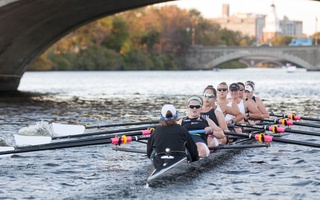From the outset, men’s lightweight assistant coach Ian Accomando said that he and the rest of the coaching staff had a clear focus for the 2017-2018 campaign: a national championship.
“We planned to work harder than we did last year,” Accomando said. “We planned to leave no stone unturned so to speak, and we planned to do that across the whole spectrum of the team, from the top of the program to the bottom of the program.”
After a phenomenal showing at last year’s IRA National Championships, in which the team took the overall points title and the varsity four took the gold, the Harvard men’s lightweight team backed up its 2016-2017 season with a strong campaign this year, remaining undefeated for most of the dual season.
{shortcode-926139500c9586b3b91322fc471da16705a18911}
The team most recently finished fourth at the Eastern Sprints Championship behind Columbia, Princeton, and Penn. Given the team’s strong rowing earlier in the season, this result was not satisfactory at all.
“Our goal at the beginning of the year was to win a national championship,” Accomando said. “We finished fourth this past weekend at the Eastern Sprints, which is disappointing to say the least. We are mixing it up. We’re pulling really hard, and we aim to go into Nationals fresh in terms of a new lineup and fitter, stronger, and mentally tougher.”
For senior Andre Dupuis, the results at Eastern Sprints demonstrated how dynamic the league is and how quickly the competition can change.
“Hats off to the competition, to Columbia and all the other crews for some fantastic racing. We’re striving to better ourselves, finding our changes going into IRAs,” Dupuis said.
Despite this late season setback, the team has much to be proud of. In the first dual race of the season, the team outlasted the previous national champion, Cornell, by more than eight seconds and fellow competitor Penn by 15 seconds to take the Mathews-Leonard Cup. After that race, sophomore Hunter Wallace noted that Cornell and Penn would only get faster come championship season.
“I think a weekend like this gives us confidence and what we’re doing with our training is working well,” Wallace said. “Continuing to do that and build off what we have because we know that the next time we see Columbia and Penn and Cornell, those boats are going to be faster.”
Harvard continued to battle and emerge victorious in multiple bouts, defeating both Columbia and Georgetown the next day and capturing the Wales-Kirrane Cup. The top varsity eight finished in 5:53, while Columbia crossed the line in 5:56 and Georgetown finished in 6:06.5.
The same results continued the next week, when the first varsity eight swept past both MIT and Dartmouth to help capture the Biglin Bowl for the Crimson. The depth of the team was also on display as the second varsity boat captured its race and the third, fourth, and fifth boats bested Dartmouth’s 3V.
After that race, junior Jack Stone, coxswain of the top varsity boat, noted that the season was still a long way from completion.
“We’re a month away from Sprints,” Stone said. “We have a tough race against Navy this weekend, and then against Yale and Princeton the weekend after that. We’re going to keep training hard and working hard.”
Consistency was the name of the game, as Harvard took the Haines Cup over Navy and Delaware after an eight hour drive to the Severn River in Annapolis, Maryland. The varsity eight edged out Navy’s boat by less than a second in 6:04.1 in a tight race decided at the finish.
The team’s only blemish on the dual season would come a week later when the crew fell to both Princeton and Yale. The Tigers would pull ahead in the varsity eight in 5:42.7, while the Bulldogs finished a second later and Harvard crossed six seconds after.
Despite losing the Vogel and Goldthwait Cups on that day, the Crimson still competed closely with the top crews in the country. For Sean Hayes, the opportunity to compete with some of the fastest boats in the country was surreal.
“For me, being a freshman, it was really something that I’ve wanted more than anything to compete, particularly at the varsity level, for Harvard, and getting to line up against those crews in particular…was incredible,” Hayes said.
Hayes said that the competitive nature of the team itself contributes to strong performances against other boats. This competitive spirit will drive the boat come June 1-3, when the team travels to New Jersey for the National Championship.
“Right now, we are doing some pretty intense training, also some really, really great training,” Hayes said. “I feel that even in the day that we’ve been training so far, that we made some really great strides. So kind of in lieu of our performance at the Eastern Sprints, we are really shaking things up, and we’re trying to find as much speed as possible.”
This may involve changes in the lineups themselves, according to junior David Wexner.
“You’ll probably see some guys from different boats switching roles, maybe interboat lineup switches because you never really know where you’ll find speed, sometimes in certain combinations, guys just click, so we’ll definitely be thorough in checking all of our options there,” Wexner said.
Dupuis echoed this sentiment and said that the team looks to respond from its Eastern Sprints performance.
“We’re introducing some new things into our training, which I think people on our team have really embraced, just basically identifying the weaknesses we had at Eastern Sprints and working our best to turn these weaknesses into our strengths,” Dupuis said. “I think that has been a key focus from the IRA training.”
—Staff writer Leon K. Yang can be reached at leon.yang@thecrimson.com.
